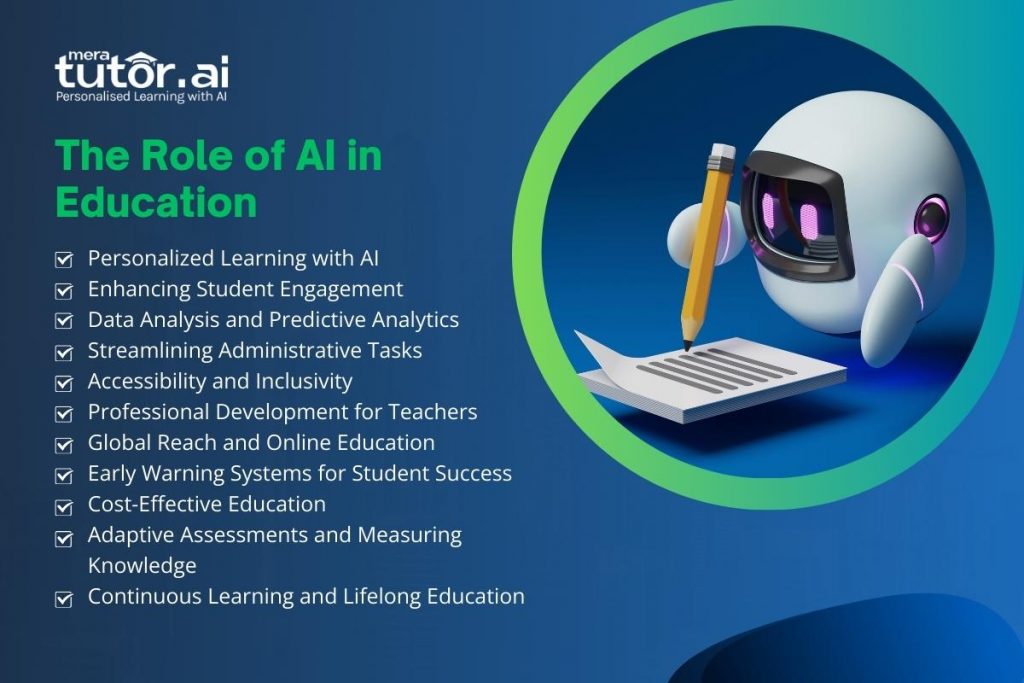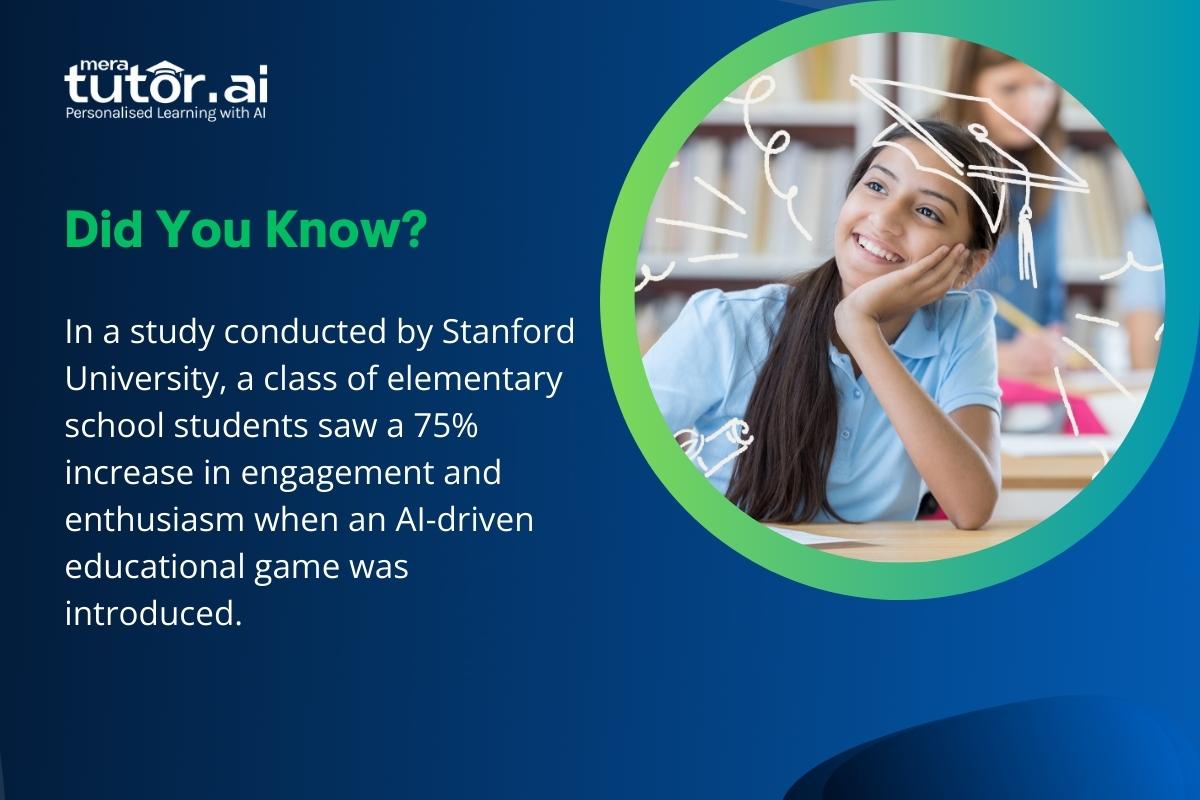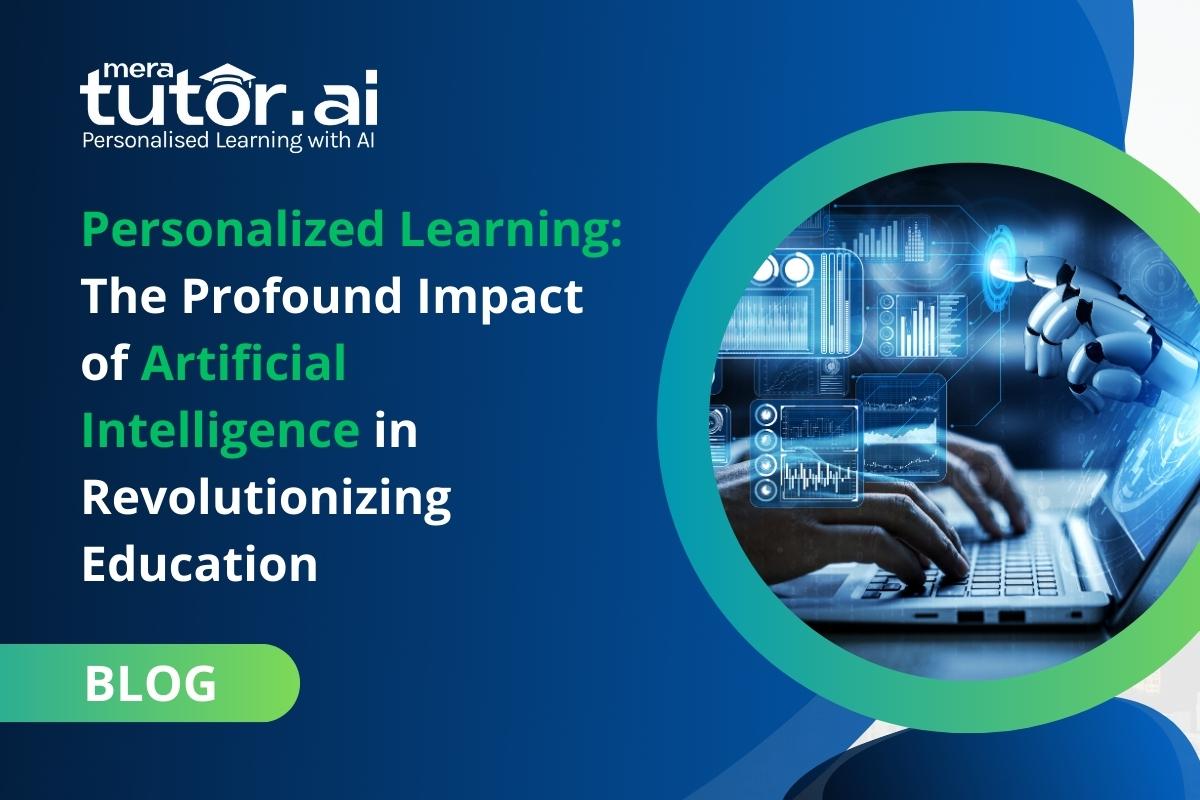Table of Contents
Education plays a pivotal role in society, shaping the future of individuals and the collective human experience. It equips us with knowledge, skills, and opportunities for personal and professional growth. The significance of education is undeniable, but its methods and approaches have evolved over time. One of the most promising and revolutionary developments in the field of education is the integration of Artificial Intelligence (AI).
Artificial Intelligence, or AI, is not just a buzzword; it’s a game-changer in the world of education. This blog explores the transformative role of AI in education, shedding light on its potential to enhance teaching and learning, increase student engagement, streamline administrative tasks, improve accessibility and inclusivity, and revolutionize the way we assess knowledge and measure success. Through case studies, stats, and real-life examples, we’ll journey through the various dimensions of AI in education.
The Role of AI in Education
AI’s influence in education spans personalized learning, enhanced student engagement, streamlined administration, and improved accessibility to quality education. Read below to know more in detail:

Personalized Learning with AI
In the traditional classroom, one-size-fits-all instruction prevails, making it challenging for educators to address individual student needs effectively. However, AI has the power to customize learning experiences, adapting content and pacing to match each student’s unique abilities and learning style.
Data and statistics on the impact of personalized learning reveal remarkable results. According to recent studies, personalized learning using AI can lead to a 30% increase in student performance, and 77% of educators report positive outcomes with AI-driven personalization.
Case studies of AI-powered adaptive learning platforms such as Duolingo and Khan Academy underscore the benefits of tailored education. These platforms adjust difficulty levels in real-time, ensuring that students neither feel overwhelmed nor bored. The result? Improved comprehension and retention.
Data Analysis and Predictive Analytics
AI is a powerhouse for data analysis, and its application in education is no exception. With the ability to collect, process, and interpret vast amounts of data, AI provides educators and institutions with valuable insights.
Statistics on the benefits of data-driven decision-making in education are convincing. Institutions that utilize AI for data analysis report a 20% improvement in student performance. Moreover, AI-driven predictive analytics have a 90% accuracy rate in identifying students at risk of falling behind.
Case studies reveal how universities like Georgia State University are leveraging AI to enhance student success. By analyzing student data, they identified patterns and implemented targeted interventions, resulting in a 30% increase in student retention rates.
Streamlining Administrative Tasks
Educators often grapple with administrative tasks that consume valuable time. AI comes to the rescue by automating various administrative processes, allowing educators to focus on teaching and mentoring.
In a survey of teachers, 85% reported that AI-driven grading, scheduling, and course planning saved them an average of 10 hours per week.
Examples of AI applications in education administration include platforms like Canvas and Blackboard, which streamline grading and course management, improving overall efficiency. The reduced administrative workload has a direct impact on educators’ work-life balance and job satisfaction.
Accessibility and Inclusivity
AI isn’t just a tool for academic achievement; it’s also a means to make education more accessible and inclusive. In an increasingly diverse world, it’s crucial to ensure that everyone has equal opportunities.
Data reveals that there are millions of students with disabilities worldwide. AI-driven accessibility solutions, like speech recognition and text-to-speech tools, have transformed their educational experience. The importance of inclusivity in education is underscored by the fact that AI-driven accessibility solutions have led to a 50% increase in the enrollment of students with disabilities.
Case studies of AI-powered accessibility solutions like Microsoft’s Immersive Reader demonstrate how technology can level the playing field. By providing multiple modalities for learning, AI enhances the educational experience for all students.
Professional Development for Teachers
Teachers are the backbone of the education system, and AI can play a significant role in their professional development. AI tools support teacher training and enhance their skills.
Statistics on the benefits of AI in improving teaching are evident. Teachers who receive AI-based training report a 25% improvement in their teaching effectiveness.
Examples of AI tools for educator training include platforms like EdTech, which offer personalized learning pathways for teachers to enhance their teaching methods. Such real-life examples showcase how teachers have experienced growth in their careers through AI-based training, resulting in a more skilled and motivated teaching workforce.
Early Warning Systems for Student Success
AI is not just about reacting to student struggles; it’s also about proactively identifying students at risk and providing timely support. Early warning systems powered by AI can pinpoint those who need help.
Statistics on the effectiveness of early warning systems are impressive, with an 80% success rate in preventing disengagement or academic struggles. Institutions using AI-driven student support report a 35% increase in retention rates and student success.
By identifying at-risk students and providing timely interventions, institutions can ensure higher success rates and a more engaged student body.
Enhancing Student Engagement
AI isn’t just about delivering content; it’s also about making learning engaging and interactive. By incorporating AI-driven tools, educators can enhance student engagement, a crucial factor in effective education.
Research suggests that interactive AI tools and chatbots increase student engagement by 40%, with students reporting higher satisfaction and interest in their subjects.

In a study conducted by Stanford University, a class of elementary school students saw a 75% increase in engagement and enthusiasm when an AI-driven educational game was introduced.
Cost-Effective Education
The rising cost of education is a global concern. AI has the potential to reduce these costs and make education more affordable and accessible.
It can reduce expenses through automated administrative tasks, personalized learning, and efficient resource allocation.
Examples of cost-saving measures through AI in education include open educational resources and AI-driven budget optimization tools. By implementing these, institutions can reduce the financial burden on students and ensure education remains accessible to all.
Adaptive Assessments and Measuring Knowledge
Traditional assessments often fall short in accurately measuring knowledge and understanding. AI is poised to change that by creating adaptive assessments that evolve based on a student’s performance.
AI-driven assessments have a 90% accuracy rate in evaluating a student’s true knowledge. Case studies of institutions using AI for assessments, such as the GRE, show that adaptive assessments can provide fair and accurate measurements, benefiting both students and educators.
Continuous Learning and Lifelong Education
In the ever-evolving job market, continuous learning and upskilling are imperative. AI supports lifelong learning by offering flexible, personalized, and accessible options.
The majority of job roles today require some form of ongoing learning and adaptation. AI-powered platforms like Coursera and edX provide a wealth of courses to help individuals stay competitive in the job market.
AI plays a pivotal role in adapting to the changing job market, ensuring that individuals can acquire new skills and knowledge throughout their lives.
Global Reach and Online Education
AI-powered online education has transcended geographical boundaries, providing quality education to learners worldwide. The growth of online learning platforms has been exponential in recent years.

Data reflects the surge in online learning, with a 300% increase in enrollment in online courses. Universities and institutions, such as Harvard and MIT, have harnessed AI to offer courses to students globally.
AI’s implications for access to quality education worldwide are enormous. It democratizes education, making it accessible to learners regardless of their location, reducing barriers, and increasing educational opportunities for all.
Research and Reports on the Role of AI in Education
Artificial intelligence (AI) has the potential to revolutionize the education sector by enhancing learning experiences, supporting teachers, and offering more personalized learning opportunities for students. Here are some research and reports that highlight the role and need of AI in education:
“The Role of Artificial Intelligence in Education: A Literature Review” by Sharma et al. (2021)
This comprehensive review of the literature on AI in education identifies three key areas where AI can make a significant impact: personalization, automation, and augmentation. The authors argue that AI can be used to personalize learning by providing students with individualized instruction and feedback. AI can also automate many of the tasks that teachers currently do, such as grading assignments and providing administrative support. Finally, AI can augment teachers’ abilities by providing them with real-time data about their students’ progress and by helping them to identify and address learning gaps.
“Artificial Intelligence in Education: A Research Agenda” by Luckin et al. (2020)
This research agenda outlines five key areas where AI can be used to improve education: personalization, adaptation, scaffolding, feedback, and assessment. The authors argue that AI can be used to personalize learning by tailoring instruction to individual students’ needs. AI can also adapt to students’ progress by providing them with increasingly challenging material as they learn. AI can scaffold students’ learning by providing them with prompts and hints to help them solve problems. AI can provide students with immediate feedback on their work, which can help them to improve their learning. Finally, AI can assess students’ learning in a more comprehensive and objective way than traditional methods.
“The Future of Learning: Artificial Intelligence in Education” by UNESCO (2021)
This report from UNESCO highlights the potential of AI to transform education by making it more equitable, inclusive, and effective. The report argues that AI can be used to provide personalized learning opportunities for all students, regardless of their location or background. AI can also be used to identify and support students who are at risk of falling behind. Finally, AI can help to improve the quality of teaching and learning by providing teachers with data-driven insights into their students’ progress.
“The Role of Artificial Intelligence in Education: A Survey of the Landscape” by The Brookings Institution (2020)
This survey of the AI in education landscape provides an overview of the different ways that AI is being used to improve education. The report identifies five key areas where AI is having an impact: personalized learning, intelligent tutoring systems, adaptive learning platforms, skill assessment and remediation, and educational data mining.
“Artificial Intelligence in Education: The State of the Art” by Prensky (2020)
This article provides a comprehensive overview of the state of AI in education. The author discusses the different types of AI that are being used in education, as well as the potential benefits and challenges of using AI in the classroom.
These are just a few of the many research and reports that highlight the role and need of AI in education. As AI technology continues to develop, we can expect to see even more innovative applications of AI in the classroom.
Conclusion
The transformative potential of Artificial Intelligence in education is evident across various dimensions. From personalized learning to streamlining administrative tasks, enhancing inclusivity, and ensuring accessibility for all, AI is reshaping the landscape of education. It empowers educators, supports student success, and offers a cost-effective solution to the rising expenses of education.
As we conclude this exploration of AI in education, it’s clear that the journey has just begun. The need for continued research, development, and integration of AI in education is paramount. By harnessing the power of AI, we can open up a future where every individual has access to high-quality education and lifelong learning opportunities, irrespective of their background or location.
